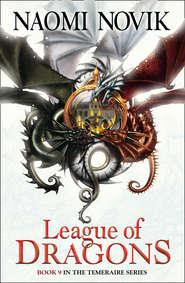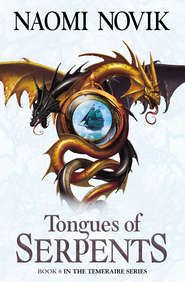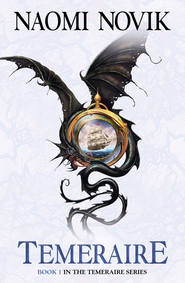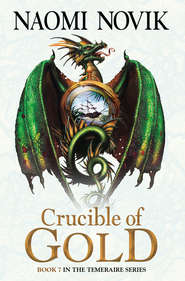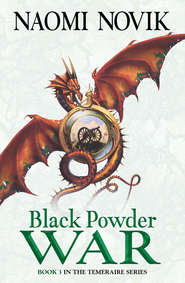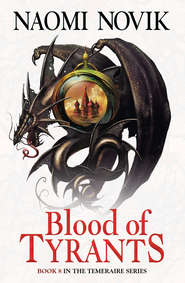По всем вопросам обращайтесь на: info@litportal.ru
(©) 2003-2024.
✖
Empire of Ivory
Автор
Год написания книги
2019
Настройки чтения
Размер шрифта
Высота строк
Поля
‘Oh, certainly! I should like to see myself do any such thing,’ Granby said, taking out his sword; he had foregone pistols since becoming Iskierka’s captain, to avoid the risk of handling open powder around her.
Laurence was too unsure of his ground to pursue an argument; Granby was not properly his subordinate any longer, and the more experienced aviator of the two of them, counting years aloft. Granby took the lead as they crossed Temeraire’s back, moving with the sureness only a boy trained up from the age of seven could have aloft; at each step Laurence handed forward his own lead-strap and let Granby lock it on to the harness for him, which he could do one-handed, that they might go more quickly.
Ferris and the topmen were still struggling with the Prussian officer in the midst of a thickening clot of men; they were disappearing from view under the violent press of bodies, only Martin’s yellow hair visible. The soldiers were near full riot, men beating and kicking at one another, thinking of nothing but an impossible escape; the knots of the carrying-harness were tightening, giving up more slack, so all the loops and bands of it hung loose and swinging with the thrashing, struggling men.
Laurence came on one of the soldiers, a young man, eyes wide and staring in his wind-reddened face and his thick moustache wet-tipped with sweat, trying to work his arm beneath the main harness, blindly, though the buckle was already straining open, and he would in a moment have slid wholly free.
‘Get back to your place!’ Laurence shouted, pointing to the nearest open loop of the carrying-harness, and thrusting the man’s hand away from the straps. Then his ears started ringing, a thick ripe smell of sour cherries flooded his nostrils as his knees folded beneath him. He put a hand to his forehead slowly, stupidly; it was wet. His own harness-straps were holding him, painfully tight against his ribs with all his weight pulling against them. The Prussian had struck him with a bottle; it had shattered, and the liquor was dripping down the side of his face.
Instinct rescued him; he put up his arm to take the next blow and pushed the broken glass back at the man’s face; the soldier said something in German and let go the bottle. They wrestled together a few moments more; then Laurence caught the man’s belt and heaved him up and away from Temeraire’s side. The soldier’s arms were spread wide, grasping at nothing; Laurence, watching, abruptly recalled himself, and at once he lunged out, reaching to his full length; but too late, and he came thumping heavily back against Temeraire’s side with empty hands; the soldier was already gone from sight.
His head did not hurt over much, but Laurence felt queerly sick and weak. Temeraire had resumed flying towards the coast, having rounded up the rest of the ferals at last, and the force of the wind was increasing. Laurence clung to the harness a moment, until the fit passed and he was able to make his hands work properly again. There were already more men clawing up: Granby was trying to hold them back, but they were overbearing him by sheer weight of numbers, even though struggling as much against one another as him. One of the soldiers grappling for a hold on the harness climbed too far out of the press; he slipped, landed heavily on the men below him, and carried them all away; as a tangled, many-limbed mass they fell into the slack loops of the carrying-harness, and the muffled wet noises of their joints and bones cracking sounded together like a roast chicken being wrenched hungrily apart.
Granby was hanging from his harness-straps, trying to get his feet planted again; Laurence crab-walked over to him and gave him a steadying arm. Below he could just make out the washy sea foam, pale against the black water; Temeraire was flying lower and lower as they neared the coast.
‘That damned Pou-de-Ciel is coming round again,’ Granby panted, as he got back his footing; the French had somehow stretched a dressing over the gash in the dragon’s wing, even if the great white patch of it was awkwardly placed and far larger than the injury made necessary. The dragon looked a little uncomfortable in the air, but he was coming on gamely nonetheless; they must have spotted Temeraire’s vulnerability. If the Pou-de-Ciel were able to catch the harness and drag it loose, it might deliberately finish what the soldiers had begun in their panic, and the chance of bringing down a heavy-weight, much less one as valuable as Temeraire, would surely tempt them to great risk.
‘We will have to cut the soldiers loose,’ Laurence said, low and wretched, and looked upwards, where the carrying-loops attached to the leather; but to send a hundred men and more to their deaths, scarce minutes from safety, he was not sure he could bear; or ever to meet General Kalkreuth again, having done it; some of the general’s own young aides were aboard Temeraire, and doing their best to keep the other men quiet.
Riggs and his riflemen were firing short, hurried volleys; the Pou-de-Ciel was keeping just out of range, waiting for the best moment to chance his attack. Then Iskierka sat up and blew out another stream of fire: Temeraire was flying ahead of the wind, so the flames were not turned against him, this time; but every man on his back had at once to throw himself flat to avoid the torrent, which burned out too quickly before it could reach the French dragon.
The Pou-de-Ciel at once darted in while the crew was distracted; Iskierka was gathering herself for another blow, and the riflemen could not get up again. ‘Christ,’ Granby said; but before he could reach her, a low rumble like fresh thunder sounded, and below them small round red mouths bloomed with smoke and powder-flashes: shore batteries, firing from the coast below. Illuminated in the yellow blaze of Iskierka’s fire, a twenty-four-pound ball of round-shot flew past them and took the Pou-de-Ciel in the chest; he folded around it like paper as it drove through his ribs, and crumpled out of the air, falling to the rocks below: they were over the shore, they were over the land, and thick-fleeced sheep were fleeing before them across the snow-matted grass.
The townspeople of the little harbour of Dunbar were alternately terrified at the descent of a whole company of dragons onto their quiet hamlet, and elated by the success of their new shore-battery, put into place scarcely two months ago and never before tried. Half-a-dozen courier-beasts driven off and one Pou-de-Ciel slain, became a Grand Chevalier and several Flammes-de-Gloire overnight, all hideously slain. The town could talk of nothing else, and the local militia strutted through the streets to general satisfaction.
The townspeople grew less enthusiastic, however, after Arkady had eaten four of their sheep; the other ferals had made only slightly less extravagant depredations, and Temeraire himself had seized upon a couple of cows, shaggy yellow-haired Highland cattle, sadly reported afterwards to be prize-winning, and devoured them to the hooves and horns.
‘They were very tasty,’ Temeraire said, apologetically; and turned his head aside to spit out some of the hair.
Laurence was not inclined to stint the dragons in the least, after their long and arduous flight, and on this occasion was perfectly willing to sacrifice his usual respect for civil property for their comfort. Some of the farmers made noises about payment, but Laurence did not mean to try and feed the bottomless appetites of the ferals out of his own pocket. The Admiralty might reach into theirs, if they had nothing better to do than sit before the fire and whistle while a battle was carrying on outside their windows, and men dying for lack of a little assistance. ‘We will not be a charge upon you for long. As soon as we hear from Edinburgh, I expect we will be called to the covert there,’ he said flatly, in reply to the protests. The horse-courier left at once.
The townspeople were more welcoming to the Prussians, most of them young soldiers pale and wretched after the flight. General Kalkreuth himself had been among these final refugees; he had to be let down from Arkady’s back in a sling, his face white and sickly under his beard. The local medical man looked doubtful, but cupped a basin full of blood, and had him carried away to the nearest farmhouse to be kept warm and dosed with brandy and hot water.
Other men were less fortunate. The harnesses, cut away, came down in filthy, tangled heaps weighted by corpses already turning green: some had been killed during the French attacks, others smothered by their own fellows in the panic, or dead of thirst, or plain terror. They buried sixty-three men out of a thousand that afternoon, some of them nameless, in a long and shallow grave laboriously pick-axed out of the frozen ground. The survivors were a ragged crew, clothes and uniforms inadequately brushed, faces still dirty, attending silently. Even the ferals, though they did not understand the language, perceived the ceremony, and sat on their haunches respectfully to watch from a distance.
Word arrived back from Edinburgh only a few hours later, but with orders so queer as to be incomprehensible. They began reasonably enough: the Prussians to be left behind in Dunbar and quartered on the town; and the dragons, as expected, were summoned to the city. But there was no invitation to General Kalkreuth or his officers to come along. On the contrary, Laurence was strictly adjured to bring no Prussian officers with him. As for the dragons, they were not permitted to enter the large and comfortable covert at all, not even Temeraire. Instead Laurence was ordered to leave them sleeping in the streets about the castle, and to report to the admiral in command in the morning.
He stifled his first reaction, and spoke mildly of the arrangements to Major Seiberling, now the senior Prussian; implying as best he could without outright falsehood that the Admiralty meant to wait until General Kalkreuth was recovered before they gave him an official welcome.
‘Oh; must we fly again?’ Temeraire said. He heaved himself wearily back onto his feet, and approached the drowsing ferals to nudge them awake: they had all crumpled into somnolence after their dinners.
Their flight to Edinburgh was slow and the days were growing short. It was only a week to Christmas, Laurence realized abruptly. The sky was fully dark by the time they reached their destination; but the castle shone out for them like a beacon, its windows and walls bright with torches as it stood on its high rocky hill above the shadowed expanse of the covert. The narrow buildings of the medieval part of the city crammed together close around it.
Temeraire hovered doubtfully above the cramped and winding streets; there were many spires and pointed roofs to contend with, and not very much room between them, giving the city the appearance of a spear-pit. ‘I do not see how I am to land here,’ he said uncertainly. ‘I am sure to break one of those buildings; why have they built these streets so small? It was much more convenient in Peking.’
‘If you cannot do it without hurting yourself, we will go away again, and orders be damned,’ Laurence said; his patience was grown very thin.
But in the end Temeraire managed to let himself down into the old cathedral square without bringing down more than a few lumps of ornamental masonry; the ferals, being all of them considerably smaller, had less difficulty. They were a little anxious at being removed from the fields full of sheep and cattle, however, and suspicious of their new surroundings; Arkady bent low and put his eye to an open window to peer inside at the empty rooms, making sceptical inquires of Temeraire as he did so.
‘That is where people sleep, is it not, Laurence? Like a pavilion,’ Temeraire said, trying cautiously to rearrange his tail into a more comfortable position. ‘And sometimes it is where they sell jewels and other pleasant things. But where are all the people?’
Laurence was quite sure that all the people had fled; the wealthiest tradesman in the city would sleep in a gutter tonight, if it were the only bed he could find in the new part of town, safely away from the pack of dragons who had invaded his streets.
The dragons eventually disposed of themselves in some manner of reasonable comfort; the ferals, used to sleeping in rough-hewn caves, were even pleased with the soft, rounded cobblestones. ‘I do not mind sleeping in the street, Laurence, truly; it is quite dry, and I am sure it will all be very interesting to look at, in the morning,’ Temeraire said, consolingly, before falling asleep with his head lodged in one alleyway and his tail in another.
But Laurence minded for him; it was not the sort of welcome which he felt they might justly have looked for, a long year away from home, having been sent halfway round the world and back. It was one thing to find themselves in rough quarters while on campaign, where no man could expect much better and might be grateful for a cow-byre to lay his head upon. But to be deposited like baggage, on cold unsanitary stones stained dark with years of street refuse, was something other; the dragons might at least have been granted use of the open farmland outside the city.
Laurence knew it was unconscious malice: the common unthinking assumption made by men who treated dragons only as inconvenient, if elevated, livestock, to be managed and herded without consideration for their own sentiments. It was an ingrained assumption. Even Laurence had recognized it as outrageous only when forced to do so by witnessing by contrast the conditions he had observed in China, where dragons were received as full members of society.
‘Well,’ Temeraire said reasonably, while Laurence laid out his own bedroll inside the house beside his head, leaving the windows open so they might continue to speak, ‘we knew how matters were here, and so we cannot be very surprised. Besides, I did not come back to make myself more comfortable, or I would have stayed in China. We must improve the circumstances of our friends. Not,’ he added, ‘that I would object to having my own pavilion; but I would rather have liberty. Dyer, pray will you retrieve that bit of gristle from between my teeth? I cannot reach far enough to put my claw upon it.’
Dyer, startled from his half-doze upon Temeraire’s back, ran to fetch the small pick from their luggage, and then scrambled obediently into Temeraire’s open jaws to scrape away.
‘You would have more luck achieving the latter if there were more men ready to grant you the former,’ Laurence said. ‘I do not mean to counsel you to despair; indeed we must not. But I had hoped to find, upon our arrival, more respect for you than when we departed, not less. It would have brought material advantage to our cause.’
Temeraire waited until Dyer had climbed out again to answer. ‘I am sure they will listen to the merits of such reform,’ he said; a large assumption, which Laurence was not at all sanguine enough to share, ‘and all the more, when I have seen Maximus and Lily and they are ranged with me. And perhaps Excidium also, for he has been in the most battles: no one could help but be impressed by him. I am sure they will see the wisdom of my arguments; they will not be as stupid as Eroica and the others were,’ Temeraire added, with obvious shades of resentment. The Prussian dragons had at first rather disdained his attempts to convince them of the merits of greater liberty and education among dragons. They were as fond of their traditional rigorous military order as their handlers, and preferred to ridicule the habits that Temeraire had acquired in China as effete.
‘I hope you will forgive me for my bluntness; but I am afraid that even if you allied the hearts and minds of every dragon in Britain with your own, it would make very little difference. As a political party you have no influence with Parliament,’ Laurence said.
‘Perhaps we do not, but I imagine if we were to go to this Parliament, we would be attended to,’ Temeraire said, an image most convincing, if not likely to produce the sort of attention Temeraire desired.
He said as much, and added, ‘We must find some better means of drawing sympathy to your cause, from those who have the influence to foster political change. I am only sorry I cannot apply to my father for advice, as relations stand between us.’
‘Well, I am not sorry, at all,’ Temeraire said, putting back his ruff. ‘I am sure he would not have helped us; and we can do perfectly well without him.’ Aside from his loyalty, which would have made him resent coldness towards Laurence on any grounds, Temeraire viewed Lord Allendale’s objections to the Aerial Corps as objections to him personally. Despite them never having met, he felt violently towards anyone whose sentiments would have seen Laurence separated from him.
‘My father has been engaged in politics for half of his life,’ Laurence said. Lord Allendale made special effort towards abolition in particular, it was a movement that had been met with as much scorn at its inception, as Laurence anticipated for Temeraire’s own cause. ‘I assure you his advice would be of the greatest value; and I do mean to effect a repair, if I can, which would allow us to consult him.’
‘I would as soon have kept it, myself,’ Temeraire muttered, meaning the elegant red vase that Laurence had purchased in China as a conciliatory gift. It had since travelled with them five thousand miles and more, and Temeraire had grown as possessive of it. He sighed when it was finally sent away, with a brief and apologetic note.
But Laurence was all too conscious of the difficulties that faced them, and of his own inadequacy to progress so vast and complicated a campaign. He had been a boy when Wilberforce had come to their house. He came as the guest of one of Lord Allendale’s political friends, newly inspired with fervour against the slave trade and just beginning the parliamentary campaign to abolish it. That was twenty years ago, and despite the most heroic efforts by men of ability, wealth and power greater than his own, a million souls or more must have been carried away from their native shores since then.
Temeraire had been hatched for only a few years; for all his intelligence, he could not yet grasp the weary struggle which was the required path to a political position, however moral and just it was, however necessary, or contrary to their immediate self-interest it was. Laurence bade him good-night without further disheartening advice; but as he closed the windows, which began to rattle gently from the sleeping dragon’s breath, the distance to the covert beyond the castle walls seemed to him less easily bridged than all the long miles which had brought them home from China.
The Edinburgh streets were quiet in the morning, unnaturally so, and deserted but for the dragons sleeping in stretched ranks over the old grey cobbles. Temeraire’s great bulk was heaped awkwardly before the smoke-stained cathedral and his tail running down into an alleyway scarcely wide enough to hold it. The sky was clear, cold and very blue, only a scattering of terraced clouds ran out to sea, a faint suggestion of pink and orange lighting the stones.
Tharkay was awake, the only soul stirring; he sat crouched against the cold in one of the narrow doorways; an elegant home, the heavy door stood open behind him. He had a cup of tea, steaming in the air. ‘May I offer you one?’ he inquired. ‘I am sure the owners would not begrudge us.’
‘No, thank you; I must go up and see about the dragons,’ Laurence said; he had been woken by a runner from the castle, summoning him to a meeting in the castle, at once. Another piece of discourtesy, when they had arrived so late; and to make matters worse, the boy had been unable to tell him if any provision had been made for the hungry dragons. What the ferals would say when they awoke, Laurence did not like to think.
‘You need not worry; I am sure they can fend for themselves,’ Tharkay said blandly, not a cheering prospect, and offered Laurence his own cup as consolation; Laurence sighed and drained it, grateful for the strong, hot brew.
He was escorted from the castle gates to the admiral’s office by a young red-coated Marine, their path winding around to the headquarters building through the medieval stone courtyards, empty and free from hurry in the early morning dimness. The doors were opened, and he went in stiffly, straight-shouldered; his face had set into disapproving lines, cold and rigid. ‘Sir,’ he said, eyes fixed at a point upon the wall; and only then glanced down, and said, surprised, ‘Admiral Lenton?’
‘Laurence. Yes, sit; sit down.’ Lenton dismissed the guard, and the door closed upon them and the musty, book-lined room; the Admiral’s desk was nearly clear, but for a single small map, a handful of papers. Lenton sat for a moment silently. ‘It is damned good to see you,’ he said at last. ‘Very good to see you indeed. Very good.’
Laurence was very much shocked at his appearance. In the year since their last meeting, Lenton seemed to have aged ten: hair gone entirely white, and a vague, rheumy look in his eyes; his jowls hung slack. ‘I hope I find you well, sir,’ Laurence said, deeply sorry, no longer wondering why Lenton had been transferred north to Edinburgh, a quieter post. He wondered what illness had ravaged him so, and who had been made commander at Dover in his place.
‘Oh…’ Lenton waved his hand, fell silent. ‘I suppose you have not been told anything,’ he said, after a moment. ‘No, that is right; we agreed we could not risk word getting out.’






